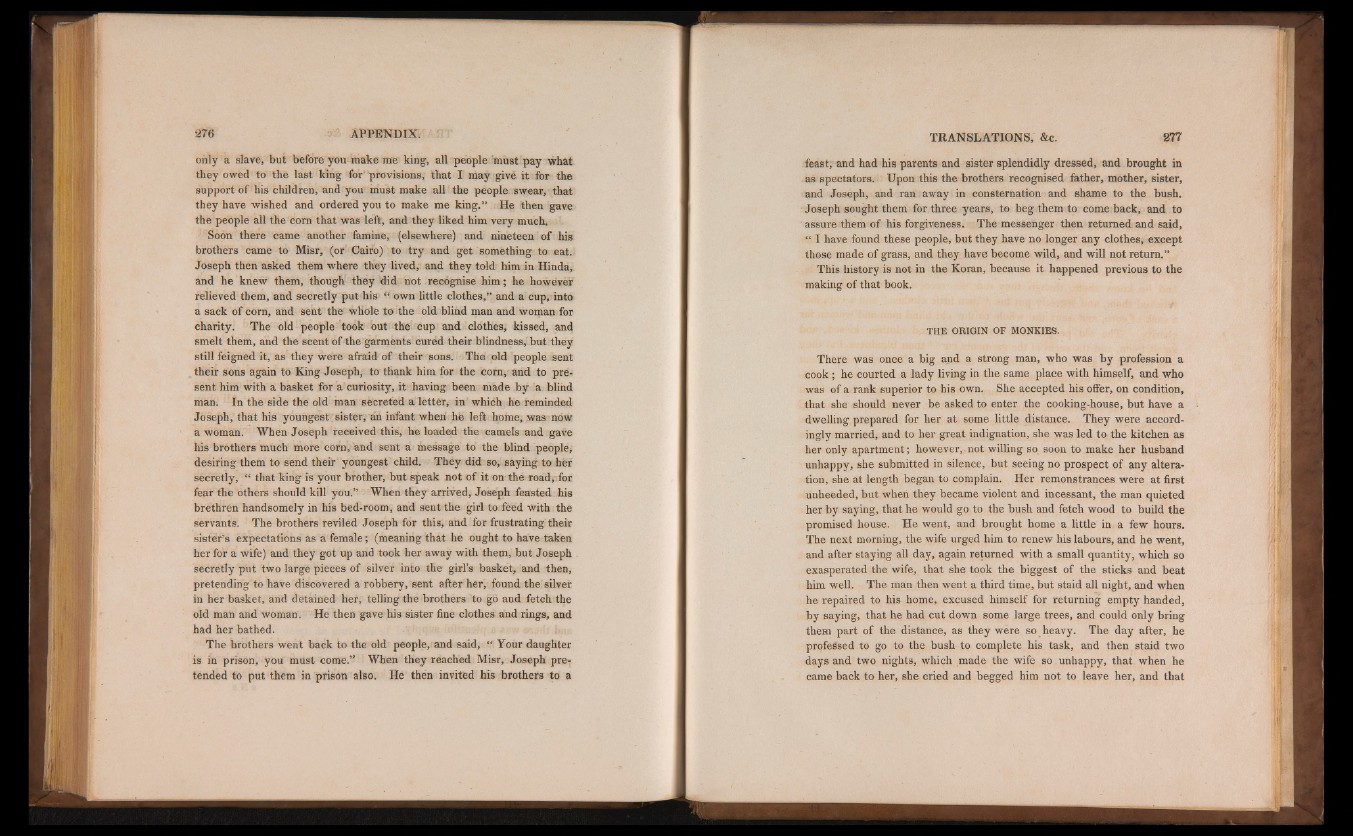
only a slave, but before you make me king, all people 'must pay what
they owed to the last king for provisions, that I may give it for the
support of his children, and you must make all the people swear, that
they have wished and ordered you to make me king.” He then gave
the people all the corn that was left, and they liked him very much.
Soon there came another famine, (elsewhere) and nineteen of his
brothers came to Misr, (or Cairo) to try and get something to eat.
Joseph then asked them where they lived, and they told him in Hinda,
and he knew them, though they did not recognise him; he however
relieved them, and secretly put his “ own little clothes,” and a cup, into
a sack of corn, and sent the whole to the old blind man and woman for
charity. The old people took out the cup and clothes, kissed, and
smelt them, and the scent of the garments cured their blindness, but they
still feigned it, as they were afraid of their sons. The old people sent
their sons again to King Joseph, to thank him for the corn, and to present
him with a basket for a curiosity, it having been made by a blind
man. In the side the old man secreted a letter, in which he reminded
Joseph, that his youngest sister, an infant when he left home, was now
a woman. When Joseph received this, he loaded the camels and gave
his brothers much more corn, and sent a message to the blind people,
desiring them to send their youngest child. They did so, saying to her
secretly, “ that king is your brother, but speak not of it on the road, for
fear the others should kill you.” When they arrived, Joseph feasted his
brethren handsomely in his bed-room, and sent the girl to feed with the
servants. The brothers reviled Joseph for this, and for frustrating their
sister’s expectations as a female; (meaning that he ought to have taken
her for a wife) and they got up and took her away with them, but Joseph
secretly put two large pieces of silver into the girl’s basket, and then,
pretending to have discovered a robbery, sent after her, found the silver
in her basket, and detained her, telling the brothers to go and fetch the
old man and woman. He then gave his sister fine clothes and rings, and
had her bathed.
The brothers went back to the old people, and said, “ Your daughter
is in prison, you must come.” When they reached Misr, Joseph pretended
to put them in prison also. He then invited his brothers to a
feast; and had his parents and sister splendidly dressed, and brought in
as spectators. Upon this the brothers recognised father, mother, sister,
and Joseph, and ran away in consternation and shame to the bush.
Joseph sought them for three years, to beg them to come back, and to
assure them of his forgiveness. The messenger then returned and said,
“ I have found these people, but they have no longer any clothes, except
those made of grass, and they have become wild, and will not return.”
This history is not in the Koran, because it happened previous to the
making of that book.
THE ORIGIN OF MONKIES.
There was once a big a„nd a strong man, who was by profession a
cook ; he courted a lady living in the same place with himself, and who
was of a rank superior to his own. She accepted his ofier, on condition,
that she should never be asked to enter the cooking-house, but have a
dwelling prepared for her at some little distance. They were accordingly
married, and to her great indignation, she was led to the kitchen as
her only apartment; however,-not willing so soon to make her husband
unhappy, she submitted in silence, but seeing no prospect of any alteration,
she at length began to complain. Her remonstrances were at first
unheeded, but when they became violent and incessant, the man quieted
her by saying, that he would go to the bush and fetch wood to build the
promised house. H e went, and brought home a little in a few hours.
The next morning, the wife urged him to renew his labours, and he went,
and after staying all day, again returned with a small quantity, which so
exasperated the wife, that she took the biggest of the sticks and beat
him well. The man then went a third time, but staid all night, and when
he repaired to his home, excused himself for returning empty handed,
by saying, that he had cut down some large trees, and could only bring
them part of the distance, as they were so heavy. The day after, he
professed to go to the bush to complete his task, and then staid two
days and two nights, which made the wife so unhappy, that when he
came back to her, she cried and begged him not to leave her, and that